Analysis: Six takeaways from the 2020 Giro d'Italia
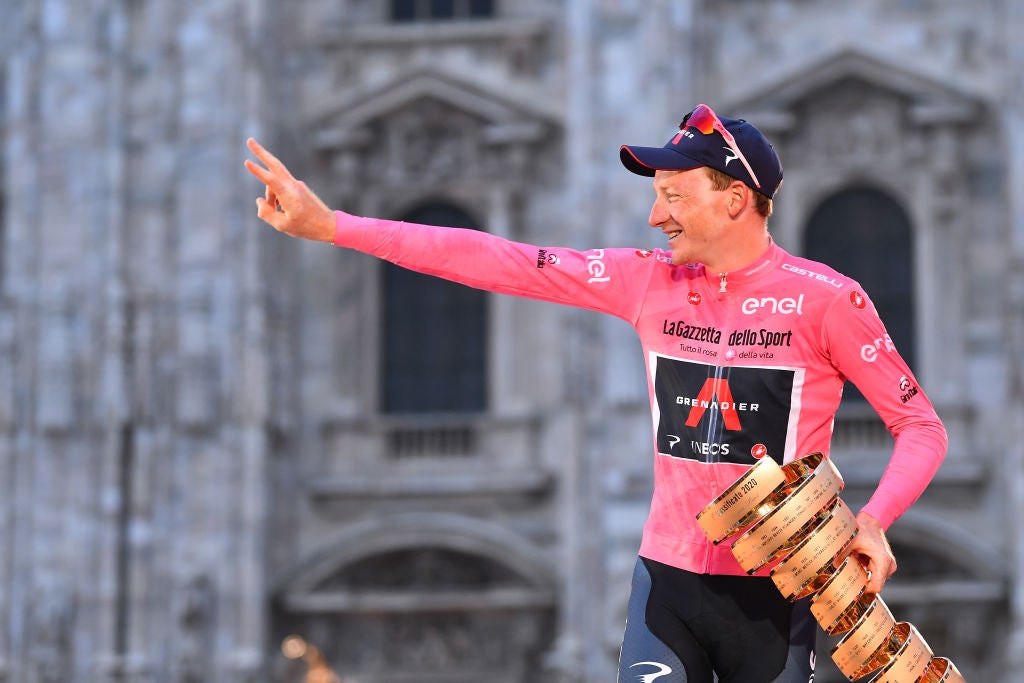
MILANO, ITALY - OCTOBER 25: Podium / Tao Geoghegan Hart of The United Kingdom and Team INEOS Grenadiers Pink Leader Jersey / Celebration / Trophy / Duomo di Milano / Milan Cathedral / during the 103rd Giro d'Italia 2020, Stage 21 a 15,7km Individual time trial from Cernusco sul Naviglio to Milano / ITT / @girodiitalia / #Giro / on October 25, 2020 in Milano, Italy. (Photo by Stuart Franklin/Getty Images,)
The 2020 Giro d’Italia is over, bringing an end to three weeks of thrilling racing, COVID-19 scares, and premature speculation that Team Ineos Grenadiers had lost its mojo.
In the end, the British team won seven stages and the maglia rosa with Tao Geoghegan Hart. The race was thrown on its head by persistent COVID-19 alarms, and the riders, seemingly fed up by race management, staged a protest. Yep, it was just another bizarre chapter in this strange 2020 WorldTour season. That said, there are some important takeaways from the 2020 edition of the Italian grand tour that will have ramifications on the sport. Come, let us dig into the six biggest takeaways from the 2020 Giro:
British cycling finds its new star
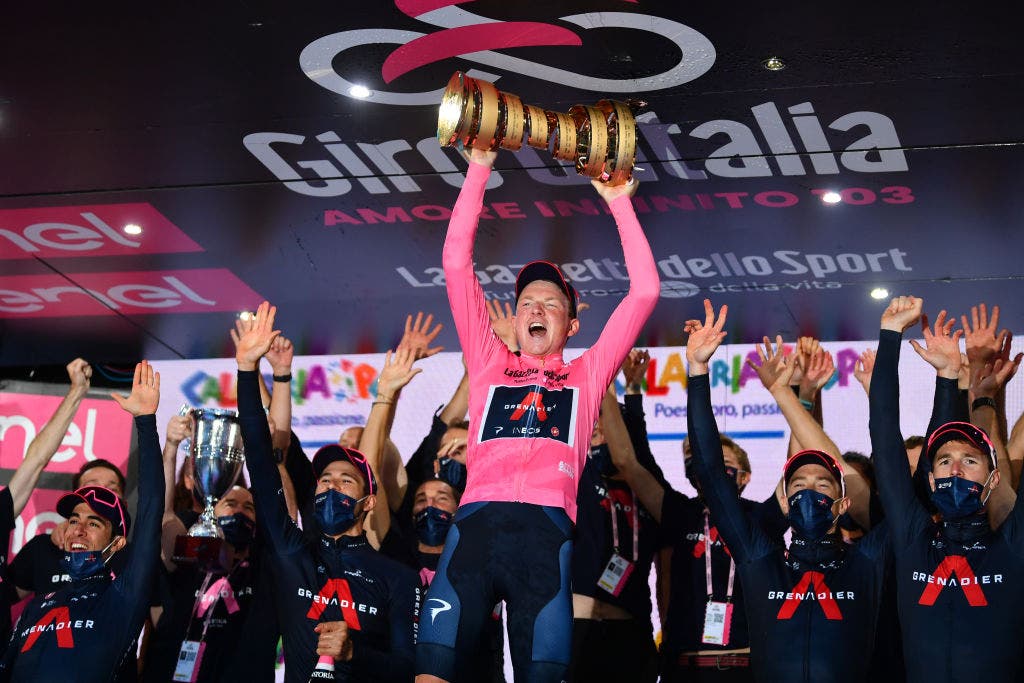
There’s a lot to like about Tao Geoghegan Hart, and his personality has taken center stage in this final week of the Giro d’Italia. Geoghegan Hart has come across as humble and honest in his post-race press conferences, acknowledging the amazing nature of his GC run in the race. He’s also got a quick wit and isn’t afraid to crack jokes. In fact, his interview personality seems to be an amalgamation of Chris Froome’s aw-shucks modesty with Geraint Thomas’ witty deadpan. When you add that into his London upbringing, his tenure in Team GB’s development ranks, and his Giro success, you come up with a bonafide cycling celebrity for British fans.
Plus, he looks great on a bicycle (sorry, Chris Froome), and he loves to win! What’s not to love?
With his Giro d’Italia win — just the second Brit behind Froome to win the Italian tour — Geoghegan Hart will inherit the British Cycling throne previously held by Chris Hoy, Bradley Wiggins, Froome, and Thomas. His star is destined to rise back home, and I wouldn’t be surprised if Geoghegan Hart became the face of British Cycling and Ineos Grenadiers in the years to come. As Wiggins said tearfully during the Eurosport telecast on Saturday:
“My son’s 15 – he looks up to you. You’re now his hero. You’ve made it mate, you’re on top of the world. Enjoy every f***ing minute and hopefully one day you’ll still be as down to earth and as modest as you are. Remember your old mate Brad and buy him a beer!
Leadership torch is passed for good at Ineos-Grenadiers
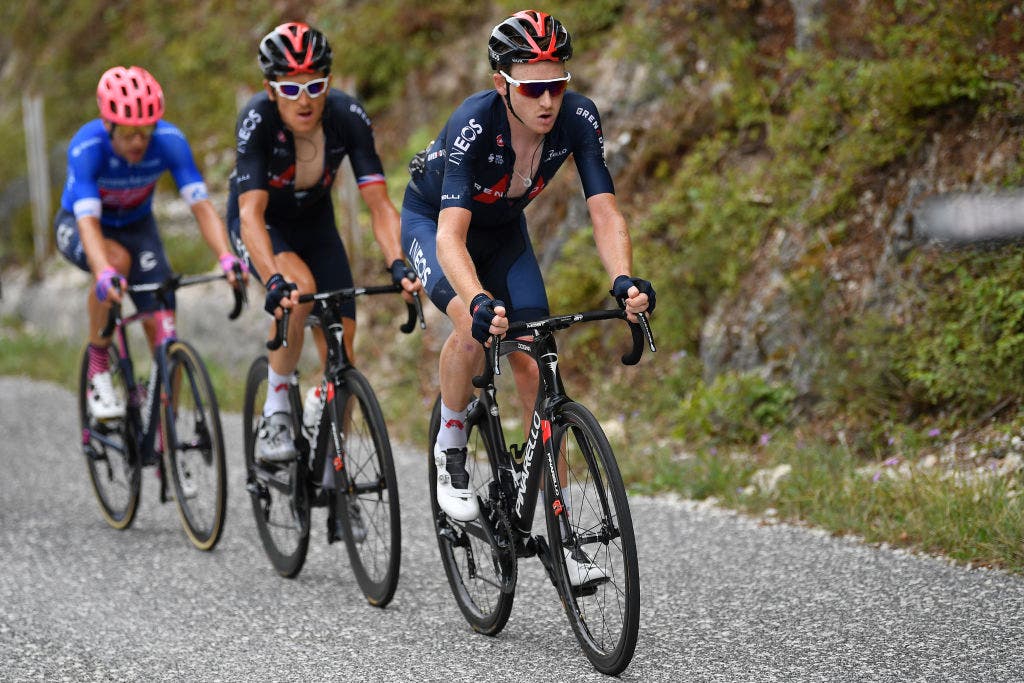
We’ve been writing about the generational shift at Ineos-Grenadiers since 2018, when the squad was still called Team Sky. Egan Bernal’s Tour de France win in 2019 marked the first major step in the squad’s move away from Chris Froome and Geraint Thomas. Well, Tao Geoghegan Hart’s overall victory at the 2020 Giro d’Italia marks the logical conclusion to this years-long process. The team’s storyline of the race offers perfect symmetry to the larger story. The team came into Italy backing Thomas, and after he crashed out, it spent several days chasing stage wins, only to win the overall with its young and hungry star Geoghegan Hart. Froome is gone for 2021, and Thomas still has a year left on his deal with the team. But the transition is complete. Ineos Grenadiers is now the squad of Egan Bernal, Tao Geoghegan Hart, and Richard Carapaz. The team of Geraint Thomas and Chris Froome is done, and now part of cycling’s storied history.
While we’re on the topic of Ineos Grenadiers, the team won SEVEN stages at this year’s Giro, with Filippo Ganna taking four by himself. This Giro may go down as the race of Ineos-Grenadiers dominance.
The hardest ‘soft’ Grand Tour in years
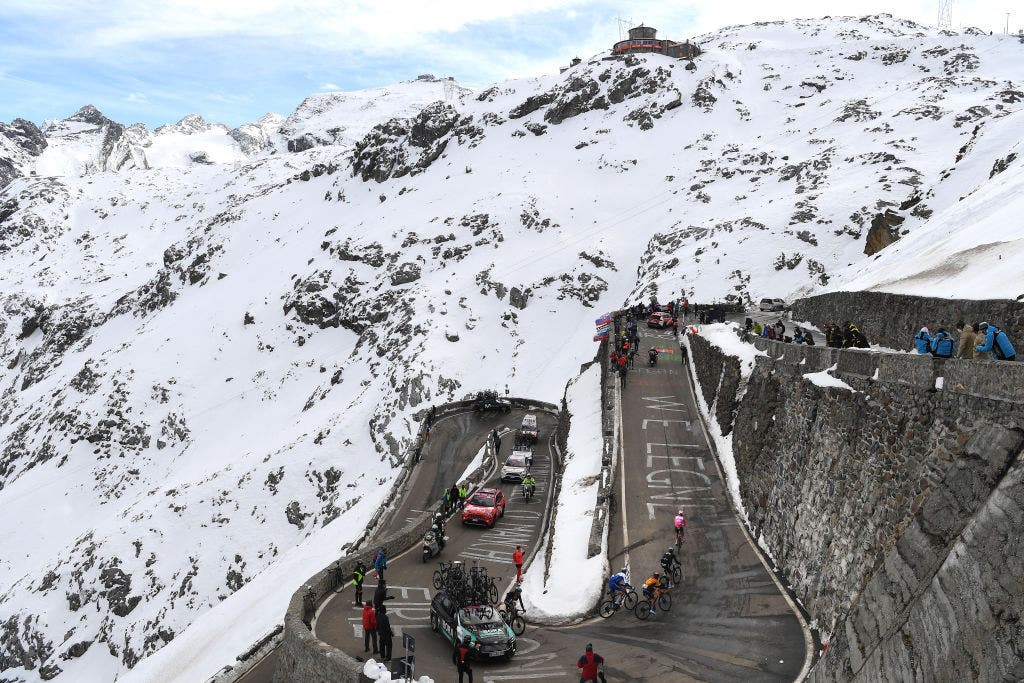
Critics of the 2020 Giro d’Italia may label the race ‘soft,’ due to the lacking firepower in the GC battle. Just three grand tour winners started this year’s race (Vincenzo Nibali, Geraint Thomas, Simon Yates), and two of them abandoned before the first rest day. Then, the race lost another top contender, Steven Kruijswijk, and two of the strongest teams in the race, Jumbo-Visma and Mitchelton-Scott, to COVID-19. And then, the race’s seasoned veterans just, well, kinda sucked. Jakob Fuglsang, Nibali, Rafal Majka, and Pello Bilbao just didn’t have it in the mountains. No Primož Roglič, no Tadej Pogačar, no Jumbo-Visma — was this race soft?
Here’s the thing, though, the counter to the ‘soft’ argument is this Giro’s route, which, on paper, appears to be one of the most brutal grand tour routes in modern history. Kudos to the Twitter handle VeloFacts for compiling some interesting Strava data from the Giro and other races on total elevation gained per-day. According to its data, two stages from this Giro (stages 18 and 17) are in the top-5 for most elevation gained (since Strava began compiling such data). Stage 18, the Stelvio day, is No. 1 with 5,542 meters (18,182 feet) of total climbing.
A COVID-19 bubble that nearly burst
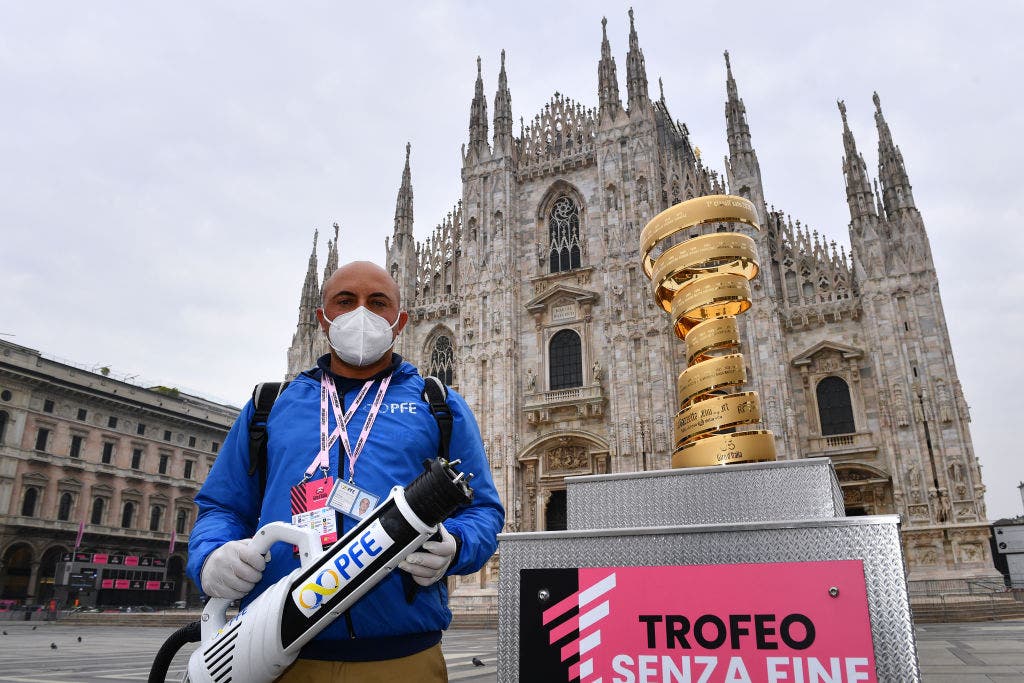
Back in July, the UCI released its plan to bring racing back amid the COVID-19 era, and the plan focused on the creation of team ‘bubbles’ as the structure to keep riders and staffers safe throughout the race. Sequestering the riders away from family, friends, and even media throughout the event, we were told, was the only way to keep the virus from infiltrating races. The plan sounded great. The Tour de France saw a few cracks in its COVID-19 bubble, and by race’s end four teams had staffers test positive, and the race director, Christian Prudhomme, also left for eight stages after contracting the virus. Still, no riders contracted the virus, and thus, COVID-19 did not impact how the race played out.
When compared to that of the Tour, the Giro d’Italia’s COVID-19 bubble was a total disaster. COVID-19 slipped into the peloton during the opening week, and all elements of the race were eventually impacted by the virus. More than 11 members of the bubble tested positive for the virus, and two entire squads left the race, both of which were hoping to contend for the overall. Sprinters Fernando Gaviria and Michael Matthews left. Pre-race favorites Simon Yates and Steven Kruijswijk both came down with COVID-19 and departed.
Many riders pointed to the race’s hotel situation in Sicily as the likely culprit for the bursting bubble. It’s a frustrating reality for riders and also media. Throughout the race, access to riders and their pre- and post-race comments was dramatically reduced — a sacrifice that seemed totally reasonable given the global catastrophe. So, to learn that the riders were coming into close quarters with hotel guests in a beachside resort was, to be honest, an embarrassment to race organizer RCS Sport.
We will never know how the race would have played out, had its COVID-19 bubble been stronger. It’s an unfortunate caveat for an otherwise classic edition of the Giro.
Arnaud Demaré > Peter Sagan
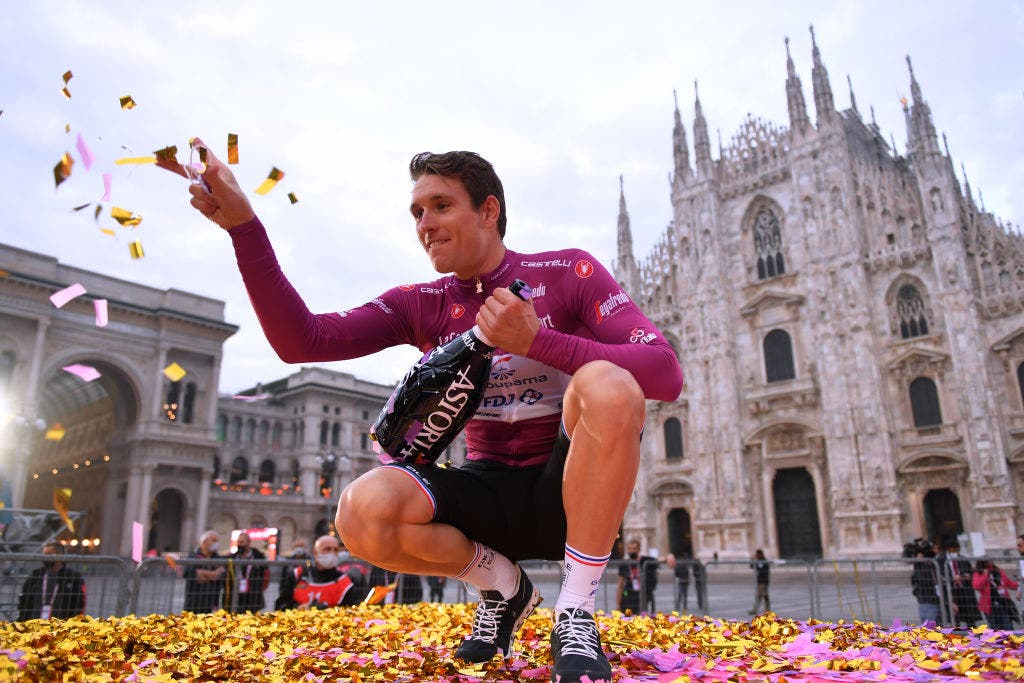
The 2020 Giro d’Italia wasn’t a total bust for Peter Sagan, who won the hilly 13th stage with a thrilling breakaway in his Giro debut. The win erased Sagan’s 450-plus day winless streak, which stretched back to the 2019 Tour de France (and included the 2020 Tour). The win gave him a single ‘W’ in his results sheet for 2020. Still, Sagan was nowhere close to Arnaud Démare in the Giro sprints, and the Frenchman claimed four stage wins, some by enormous margins. Démare’s Groupama-FDJ team, it seemed, didn’t have to do much work in order to set its ace up for the victories, either. On some occasions it was Bora-Hansgrohe that powered the peloton back to the breakaway, only to see Démare eat Sagan’s lunch in the kick to the line.
In the, end it was Démare, and not Sagan, who took the race’s points jersey.
“Race is race,” is a Sagan quote that succinctly describes his Giro debut. And, perhaps, “Season is season” is an appropriate way to describe his 2020 in general.
Riders take the power back
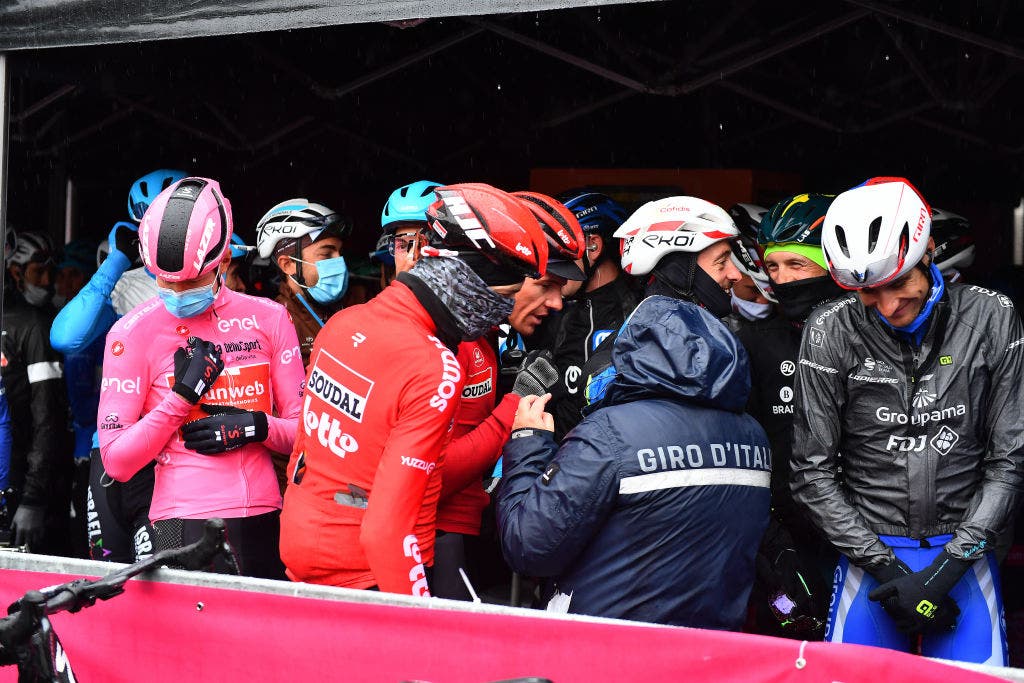
I’d be remiss to write about the 2020 Giro d’Italia without mentioning the unprecedented rider protest that occurred on stage 19, which forced organizers to shorten a 258-kilometer slog through the rain by more than 100km. Critics blasted the riders for refusing to take the start line amid the driving rain after organizers added another 5km to the stage. Riders pointed to the global pandemic, the race’s excruciatingly long transfers, and the weather as the reason to protest. Critics lambasted the move, and a host of retired riders criticized the peloton for being soft.
I shared my opinion on Friday — I support the riders for stepping up to force race management to deviate from its plan. In the wake of the Giro management’s failure to protect riders from COVID-19, I think that the riders should have felt empowered to push back. While the timing and nature of the pushback was hardly ideal, the decision could be a sign of a more empowered peloton.